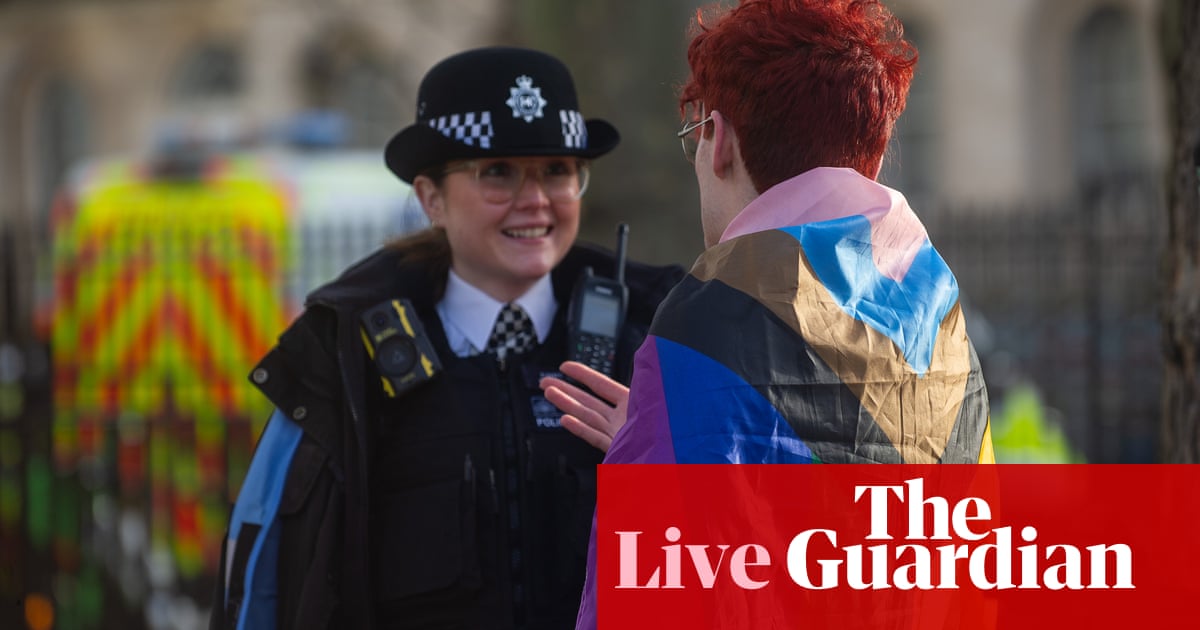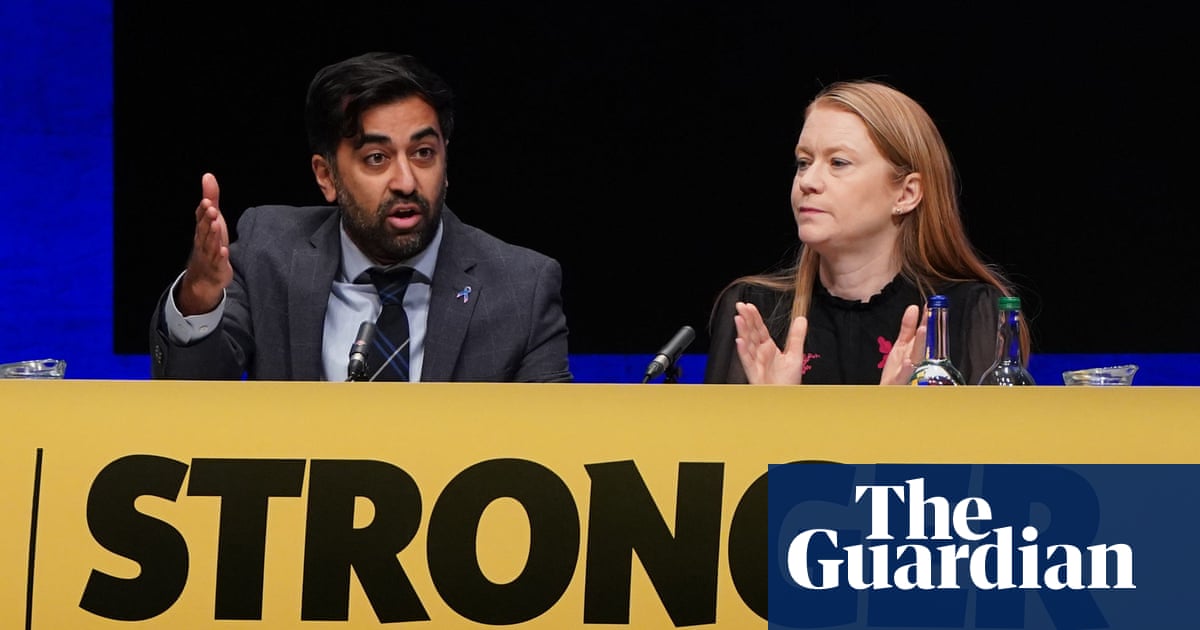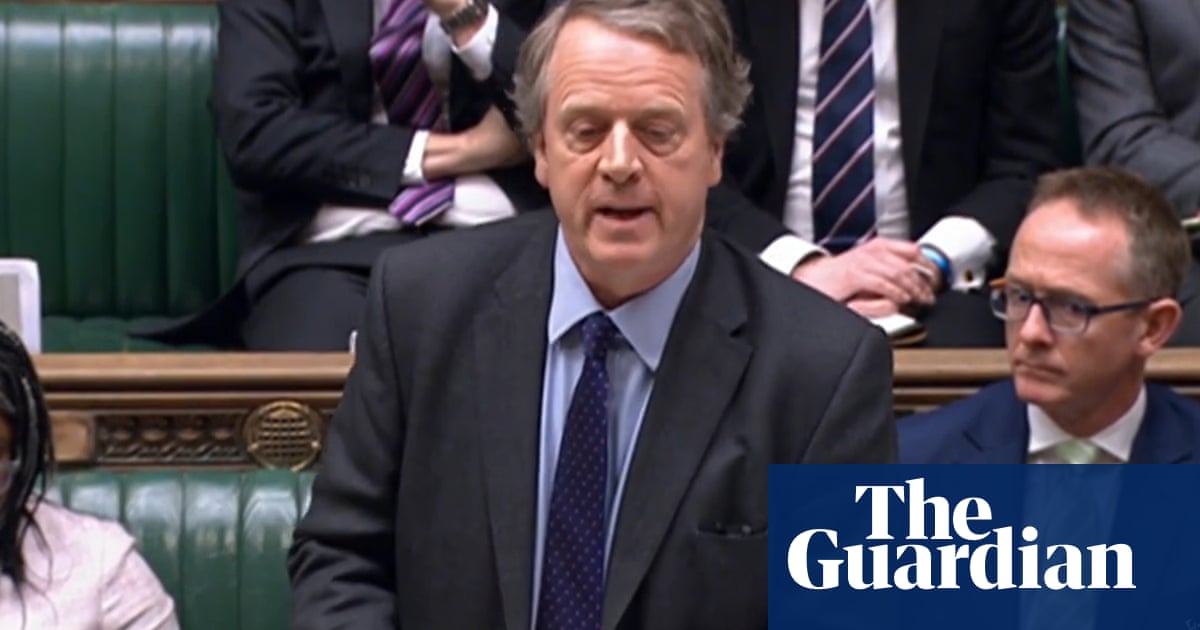
Sturgeon confirms Scottish government will go to court to challenge UK government"s decision to block its bill
Nicola Sturgeon, Scotland’s first minister, has confirmed that the Scottish government will go to court to challenge the UK government’s decision to block its gender recognition reform bill. In an interview with the BBC, she said:
In doing so we will be vigorously defending something else, and that is the institution of the Scottish parliament and the ability of MSPs, democratically elected, to legislate in areas of our competence. In short, we’ll be defending Scottish democracy.
Summary
Here is round-up of the day’s top stories from Westminster:
Nicola Sturgeon, Scotland’s first minister, has confirmed that the Scottish government will go to court to challenge the UK government’s decision to block its gender recognition reform bill. In an interview with the BBC, she said: “In doing so we will be vigorously defending something else, and that is the institution of the Scottish parliament and the ability of MSPs, democratically elected, to legislate in areas of our competence. In short, we’ll be defending Scottish democracy.”
The Scottish government has estimated that between 250 and 300 people will apply for a gender recognition certificate every year if its bill becomes law, the UK document on the section 35 order decision says. That is currently a tenfold increase because only around 30 people currently apply, the document says.
Ian Murray, the shadow Scottish secretary, said the reasons given by the government to justify the section 35 order were “pretty weak and pretty flimsy” at first glance. But he refused to condemn the use of the section 35 order outright, and instead he criticised both the UK and Scottish governments, depicting them both as unreasonable.
Social media bosses who ignore or deliberately flout rules aimed at protecting children could face jail under plans drawn up as Rishi Sunak bowed to pressure from rebel Tories. The prime minister was facing a major backbench rebellion as 50 MPs put their names to an amendment to the online safety bill that would make tech chiefs criminally liable if they do not block minors from seeing damaging content on their platforms. The compromise plan put forward by the culture secretary, Michelle Donelan, would hold bosses accountable “in a way which is effective and targeted towards child safety”.
The University and College Union has announced that its latest strike action will begin on 1 February, alongside teachers, railway workers and civil servants, in action likely to affect 150 universities across the UK. Up to 70,000 UCU members could go on strike as part of their long-running dispute with higher education employers over pay, pensions and working conditions. The 1 February strike is the first of 18 days of action that the union has threatened to take over the next two months.
The independent inquiry looking at the murder of Sarah Everard by a serving police officer will also consider the crimes of David Carrick, the home secretary announced. Suella Braverman told the Commons Dame Elish Angiolini will include the 48-year-old’s offending in her inquiry, which was set up in November 2021.
Brexit has led to a shortfall of 330,000 people in the UK labour force, mostly in the low-skilled economy, a report by leading researchers has found. The UK’s departure from the EU in 2020 led to an increase in immigration from non-EU countries but not enough to compensate for the loss of workers from neighbouring countries, according to the joint findings of the thinktanks Centre for European Reform (CER) and UK in a Changing Europe.
Michelle Donelan, the culture secretary, has announced that the government will go ahead with a ban on conversion practices. Curiously, she has made the announcement in a Commons written statement, which is mostly about the online safety bill, and which provides details of the concession to potential Tory rebels revealed last night.
That’s it from me, Tom Ambrose, and indeed the UK politics live blog for today. The blog will be back tomorrow morning but, for now, it’s goodnight from us.
People should have to opt in, not out, to see harmful content online, the SNP said.
Urging MPs to back an SNP amendment to the bill aimed at making the change, the party’s Cabinet Office spokesperson, Kirsty Blackman, said the safest option “should be the default option”.
She added:
That is the point of view we should start from.
We should start from the point of view that if anyone wants to see eating disorder content, if they want to see racist content that doesn’t meet the bar of illegality, if they want to see incredibly harmful content that does not meet that bar, they should have to opt in to receive that content.
They shouldn’t see that by default, they should have to make that actual choice that they want to see that content.
Measures to criminalise social media bosses who flout rules aimed at protecting children online may go too far and may not be effective, a Conservative former minister said.
Sir Jeremy Wright questioned the effectiveness of an amendment to the online safety bill by Tory rebels, telling the Commons:
There is a strong case for extending criminal liability but I have to say I think new clause two goes too far.
The former culture secretary said there were two fundamental problems with the amendment, the first being that it “potentially criminalises any breach of a safety duty” as it is drafted too broadly.
He added:
The second difficulty with the new clause, and which I hope the government will pick up when it looks again at this, is the difficulty of prosecuting successfully the sort of offences that we may create.
Priti Patel thanked ministers for accepting that criminal liability for rogue social media bosses “had to be addressed”.
The Conservative former home secretary also asked for reassurances that the provisions in new clause two will not be “diluted” in the House of Lords by ministers.
She told MPs:
We need to know that those protections will not be diluted. This is such a sensitive issue. And I think we’ve come a long way and that’s very much thanks to all colleagues across both sides of the house as well.
It is important that we get the right outcomes because all of us want to make sure that children are protected from some dreadful harms that we’ve seen online.
Online platforms must go further in giving users a “transparent, effective complaints process”, Labour has said.
Speaking in support of his party’s new clause one, shadow culture minister Alex Davies-Jones said:
It is vital that platforms’ complaints procedures are fit for purpose, and this new clause will finally see the secretary of state publishing a report on the options available to individuals.
We already know that the bill in its current form is failing to consider an appropriate avenue for individual complaints. This really is a classic case of David and Goliath, and it’s about time that these platforms go further in giving their users a transparent, effective complaints process.
Davies-Jones criticised the government for proceeding to remove the clauses around legal but harmful content “in a quiet room on committee corridor” just before Christmas, arguing “this move put the entire bill at risk”.
Labour will support the third reading of the online safety bill as “each day of inaction allows more and more harm to spread”.
Commenting on the government bowing to pressure from rebel Tories on jail time for rogue social media bosses, shadow culture minister Alex Davies-Jones told the Commons:
It would be remiss of me not to make a brief comment on the government’s last-minute U-turns around this stance on criminal sanctions.
The fact that we are seeing amendments withdrawn at the last minute goes to show that this government have absolutely no idea where they truly stand on these issues; the fact that they are ultimately too weak to stand up against vested interest, whereas Labour are on the side of the public and have consistently put safety at the forefront throughout the bill’s passage.
We need to be moving forwards with this bill, not backwards. That is why, despite a significant government delay, we will support it receiving its third reading, as each day of inaction allows more and more harm to spread online.
Brexit has led to a shortfall of 330,000 people in the UK labour force, mostly in the low-skilled economy, a report by leading researchers has found.
The UK’s departure from the EU in 2020 led to an increase in immigration from non-EU countries but not enough to compensate for the loss of workers from neighbouring countries, according to the joint findings of the thinktanks Centre for European Reform (CER) and UK in a Changing Europe.
Their calculations took account of recent Office for National Statistics figures that showed an overall reduction in net immigration of 540,000 to June 2022.
The independent inquiry looking at the murder of Sarah Everard by a serving police officer will also consider the crimes of David Carrick, the home secretary announced.
Suella Braverman told the Commons Dame Elish Angiolini will include the 48-year-old’s offending in her inquiry, which was set up in November 2021.
Describing Carrick’s crimes as “a monstrous campaign of abuse”, Braverman said more shocking cases may come to light as police forces increase their efforts to root out corrupt officers.
At Westminster the Labour party has been reluctant to criticise the government for using a section 35 order to block Scotland’s gender recognition reform bill. But in Wales the Labour first minister, Mark Drakeford, has criticised the UK government. As the BBC reports, he told the Senedd today:
The UK government’s decision to use powers that have never been used in the history of devolution is a very dangerous moment.
I agree with the first minister of Scotland that this could be a very slippery slope indeed.
That is all from me for today. My colleague Tom Ambrose is taking over now.
The government won the vote after the section 35 order debate (see 5.31pm) by 318 votes to 71 – a majority of 247. But the vote does not have any effect, because MPs were just voting on a motion about having had a debate.
The Scottish government has estimated that between 250 and 300 people will apply for a gender recognition certificate every year if its bill becomes law, the UK document on the section 35 order decision says. That is currently a tenfold increase because only around 30 people currently apply, the document says.
But the current figures say more about the process (widely criticised as intrusive, bureaucratic and time-consuming) than they do about the number of people who might want to legally change gender. The Scottish government says there are around 25,000 trans people in Scotland, of whom only 600 have a gender recognition certificate.
In the Commons the debate on the section 35 order is now over. A vote is now taking place. It will not have any practical effect – it is just on a motion saying MPs have debated the issue – but SNP MPs are using it to register their opposition.
University staff to go on strike on 1 February, UCU union says
The University and College Union has announced that its latest strike action will begin on 1 February, alongside teachers, railway workers and civil servants, in action likely to affect 150 universities across the UK.
Up to 70,000 UCU members could go on strike as part of their long-running dispute with higher education employers over pay, pensions and working conditions. The 1 February strike is the first of 18 days of action that the union has threatened to take over the next two months.
Jo Grady, UCU’s general secretary, said:
On 1 February, 70,000 university staff will walk out alongside fellow trade unions and hundreds of thousands of other workers to demand their fair share.
UCU remains committed to reaching a negotiated settlement, but if university employers don’t get serious and fast, more strike action will follow in February and March.
Labour says arguments used by government to justify section 35 order "pretty weak and pretty flimsy"
Ian Murray, the shadow Scottish secretary, said the reasons given by the government to justify the section 35 order were “pretty weak and pretty flimsy” at first glance.
But he refused to condemn the use of the section 35 order outright, and instead he criticised both the UK and Scottish governments, depicting them both as unreasonable. He told MPs:
It’s very difficult to conclude anything other than today’s debate being about two governments who are incapable of working together.
Murray also repeatedly sought to avoid saying whether Labour was in favour or against the section 35 order.
My colleague Peter Walker has not had any more luck trying to get an answer on this from Labour HQ.
In the debate on section 35 order the SNP’s Hannah Bardell criticised those Tories who are unhappy about the Scottish gender recognition reform bill on the grounds that it will “remove any requirement for third-party verification or
evidence from the process”. She told MPs:
If I’m not wrong, when I came out I did not have to seek verification from anybody to be a lesbian.
So I do not understand why we’re treating trans people as if they’re applying for some kind of arbitrary, inanimate thing. This is about their identity, this is about their lives and it’s about their livelihood, and we should treat them with the dignity and respect that they deserve.
Donelan says government to go ahead with ban on conversaion practices, including for trans people
Michelle Donelan, the culture secretary, has announced that the government will go ahead with a ban on conversion practices.
Curiously, she has made the announcement in a Commons written statement, which is mostly about the online safety bill, and which provides details of the concession to potential Tory rebels revealed last night ahead of the debate due later this evening.
The government has shifted all over the place on a conversion therapy ban over the past year. The Tories were committed to a full ban under Theresa May, and the pledge remained when Boris Johnson replaced her. Then, in March last year, it was reported that Johnson was dropping the promise. The revelation triggered a backlash, and within hours the government said it would go ahead with a ban – but only for conversion practices aimed at gay people, not for those aimed at trans people.
Now the full ban, including trans conversion practices, is back on, Donelan says. She says:
We are announcing today that the government will publish a draft bill which will set out a proposed approach to ban conversion practices, this will apply to England and Wales. The bill will protect everyone, including those targeted on the basis of their sexuality, or being transgender.
The government will publish the draft bill shortly and will ask for pre-legislative scrutiny by a joint committee in this parliamentary session.
The announcement seems timed to appease the relatively small cohort of Tory MPs who speak out on LGBTQ+ rights and who will have been concerned by the section 35 order decision, and particularly by claims that it is part of a No 10 “culture war” agenda.
In fact, Rishi Sunak seems notably less keen on “culture war” politics than Johnson was. Downing Street has not put up Kemi Badenoch, the equalities minister and someone who relishes “culture war” battles, to comment on the section 35 order, and although in the Commons earlier many Tory MPs were eager to attack the Scottish bill on the grounds that it was a supposed threat to women and girls in the UK, Alister Jack, the Scottish secretary, did not talk up these concerns. Instead, he focused more on the constitutional issues.
How UK government argues Scottish gender recognition bill might stop some Britons claiming equal pay
In the Commons Pete Wishart (SNP) told MPs that, after a brief look at the government document, he thought its arguments were “specious” and “hypothetical”. He claimed the UK government seemed to be arguing that, under the Scottish bill, a man might change gender so that he could qualify for lower pay.
One example of that is on equal pay – they seem to believe a trans man would take advantage of the opportunity to be paid less. That’s the type of rubbish that’s included in this.
This generated much laughter in the Commons. In fact, the document does not say that. But what it does say is almost as improbable.
He was referring to a passage in the document that implies that the Scottish bill could undermine equal pay law because, if a worker changes gender, but they also happen to be the best comparator for someone bringing an equal pay dispute, then the person bringing that claim might be disadvantaged. The document says:
Where a claimant may deem a colleague to be the most appropriate comparator of the opposite sex, but that colleague then receives a GRC, the 2010 Act would not enable them to be cited as the comparator in the claim. This could prevent the comparator test from accurately identifying what might otherwise have been deemed unlawful.
As the criteria for being issued with a GRC under the 2004 Act presently mean GRCs can only be issued to a small group who have lived in their acquired gender for at least 2 years, the effect of this on equal pay provisions is significantly limited.
However, the bill will allow a new and significantly broader category of people to change their legal sex. As more individuals are eligible to change their legal sex, the adverse effect on the operation of the 2010 Act’s equal pay provisions grows. In particular, an individual’s ability to gain a full GRC after living in their acquired gender for 6 or 9 months would increase the likelihood of equal pay claims involving individuals who had started and completed the gender recognition process only relatively recently or who obtained a GRC while a claim was ongoing.
Many of us would conclude that the chances of this happening – in equal pay cases where no other “comparators” are available – seem very, very remote. And the chances of this producing a genuine equal pay injustice seem non-existent.
In its own document the government admits these issues “may arise infrequently”. But it claims in some instances these issues could be “significant”.












